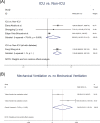Ferritin in the coronavirus disease 2019 (COVID-19): A systematic review and meta-analysis
- PMID: 33078400
- PMCID: PMC7595919
- DOI: 10.1002/jcla.23618
Ferritin in the coronavirus disease 2019 (COVID-19): A systematic review and meta-analysis
Abstract
Objective: The coronavirus disease 2019 (COVID-19) has rapidly developed into a pandemic. Increased levels of ferritin due to cytokine storm and secondary hemophagocytic lymphohistiocytosis were found in severe COVID-19 patients. Therefore, the aim of this study was to determine the role of ferritin in COVID-19.
Methods: Studies investigating ferritin in COVID-19 were collected from PubMed, EMBASE, CNKI, SinoMed, and WANFANG. A meta-analysis was performed to compare the ferritin level between different patient groups: non-survivors versus survivors; more severe versus less severe; with comorbidity versus without comorbidity; ICU versus non-ICU; with mechanical ventilation versus without mechanical ventilation.
Results: A total of 52 records involving 10 614 COVID-19-confirmed patients between December 25, 2019, and June 1, 2020, were included in this meta-analysis, and 18 studies were included in the qualitative synthesis. The ferritin level was significantly increased in severe patients compared with the level in non-severe patients [WMD 397.77 (95% CI 306.51-489.02), P < .001]. Non-survivors had a significantly higher ferritin level compared with the one in survivors [WMD 677.17 (95% CI 391.01-963.33), P < .001]. Patients with one or more comorbidities including diabetes, thrombotic complication, and cancer had significantly higher levels of ferritin than those without (P < .01). Severe acute liver injury was significantly associated with high levels of ferritin, and its level was associated with intensive supportive care, including ICU transfer and mechanical ventilation.
Conclusions: Ferritin was associated with poor prognosis and could predict the worsening of COVID-19 patients.
Keywords: COVID-19; comorbidity; diagnosis; ferritin; mortality; severity.
© 2020 The Authors. Journal of Clinical Laboratory Analysis Published by Wiley Periodicals LLC.
Conflict of interest statement
None.
Figures







References
-
- World Health Organization . https://covid19.who.int/. Accessed June 17, 2020.
Publication types
MeSH terms
Substances
Grants and funding
LinkOut - more resources
Full Text Sources

